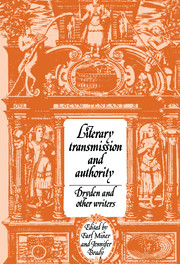Book contents
- Frontmatter
- Contents
- Contributing authors
- Preface
- Acknowledgments
- Introduction: borrowed plumage, varied umbrage
- 1 Dryden and negotiations of literary succession and precession
- 2 Onely victory in him: the imperial Dryden
- 3 Ovid reformed: issues of Ovid, fables, morals, and the second epic in Fables Ancient and Modern
- 4 Another and the same: Johnson's Dryden
- Index
3 - Ovid reformed: issues of Ovid, fables, morals, and the second epic in Fables Ancient and Modern
Published online by Cambridge University Press: 19 January 2010
- Frontmatter
- Contents
- Contributing authors
- Preface
- Acknowledgments
- Introduction: borrowed plumage, varied umbrage
- 1 Dryden and negotiations of literary succession and precession
- 2 Onely victory in him: the imperial Dryden
- 3 Ovid reformed: issues of Ovid, fables, morals, and the second epic in Fables Ancient and Modern
- 4 Another and the same: Johnson's Dryden
- Index
Summary
As the preceding chapters have shown, a major feature of Dryden's career is his engagement with many authors, whether forerunners or contemporaries. Dryden's financial and other problems after the Revolution of 1688 led him first to the theater and then, on an increasing scale, to translation. Before his Fables (1700), he engaged in two major poetic translations, the Satires of Juvenal and Persius (1693) and the monumental Virgil (1697), which we have yet to understand. Looking back over his career, we see (on smaller scale) translations of Theocritus, Horace, and Lucretius. Fables Ancient and Modern is remarkable for its attention to two medieval–modern writers, Chaucer and Boccaccio, along with two ancients, Homer and Ovid. What follows here is an attempt to describe Dryden's reformation of the poet of changing forms, Publius Ovidius Naso.
His first published translations were of three poems from Ovid's Heroides included in the joint venture, Ovid's Epistles (1680). In the account he prefixed to Annus Mirabilis (1667), he had held that Ovid's Dido in the Heroides was a creation superior to Virgil's in the Aeneid. And in the Essay of Dramatick Poesie (1668), he praised Ovid's natural talents for drama. From these earlier writings to the end of his life, he keeps mentioning Ovid and, from time to time, translating him. If we can judge from frequency of publication in the seventeenth century, his taste was widely shared. Ovid is more frequently published than Homer, Virgil, or Horace, all of whom Dryden, as well as others, seems to have found greater or more respectable than the author of the Amores, from which, however, he also translated a couple of examples.
- Type
- Chapter
- Information
- Literary Transmission and AuthorityDryden and Other Writers, pp. 79 - 120Publisher: Cambridge University PressPrint publication year: 1993
- 2
- Cited by



